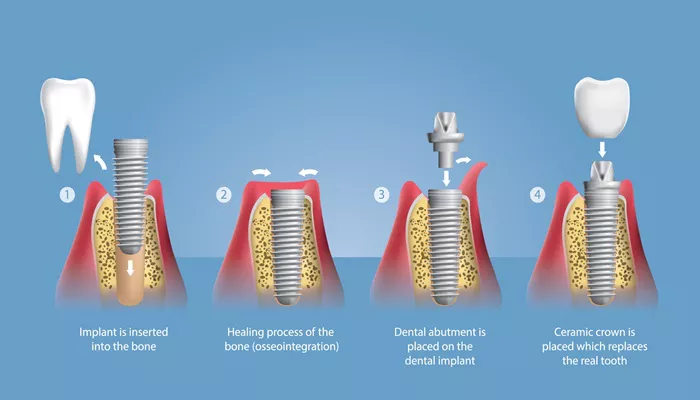Dental implants have become a popular solution for individuals seeking to replace missing teeth. However, many potential patients are concerned about the pain associated with the procedure. Understanding which part of the dental implant process is the most painful can help alleviate some of these fears. This article will explore the pain experience related to dental implants, focusing on the most painful aspects of the procedure and recovery.
What Is Dental Implants?
Dental implants are artificial tooth roots made of titanium that are surgically placed into the jawbone. They serve as a strong foundation for fixed or removable replacement teeth that are designed to blend in with natural teeth. The procedure typically involves several steps: initial consultation, implant placement, healing period, and finally, attachment of the crown (the visible part of the tooth).
Despite advancements in dental technology and anesthesia, many patients still express concern about pain during and after the implant procedure. Understanding what to expect can significantly reduce anxiety and improve overall satisfaction with the treatment.
The Most Painful Part of Dental Implants
1. The Surgical Drilling Process
The most painful part of getting a dental implant is often considered to be the drilling process required for placing the implant into the jawbone. This step involves creating a precise hole in the bone where the implant will be anchored. While local anesthesia is used to numb the area, some patients report feeling pressure or discomfort during this phase.
Local Anesthesia: Most dental implant procedures are performed under local anesthesia, which numbs the area around the implant site.
This means that while patients should not feel sharp pain during drilling, they may still experience sensations that can be uncomfortable.
Patient Sensitivity: Individual pain tolerance varies widely among patients. Some may feel more discomfort than others during this phase, especially if they have heightened anxiety or sensitivity in their gums and jaw.
SEE ALSO: How Much Does A Dental Implant Cost in Georgia
2. Post-Surgical Discomfort
After the drilling process is complete and the implant is placed, patients often experience post-surgical discomfort as anesthesia wears off. This discomfort can include:
Soreness: Patients commonly report soreness in the gums and jaw where the implant was placed. This soreness can last for several days.
Swelling and Bruising: Swelling around the surgical site is typical and can peak around 48 hours post-surgery. Bruising may also occur, contributing to discomfort.
Pain Management: Dentists usually prescribe over-the-counter pain medications such as ibuprofen or acetaminophen to help manage post-operative pain.
3. Healing Period
The healing period following dental implant surgery can also present challenges for patients:
Bone Integration: The process of osseointegration—where the bone grows around and integrates with the implant—can cause discomfort as it involves biological changes in the jawbone.
Infection Risk: If proper care is not taken post-surgery, there is a risk of infection which can lead to increased pain and complications.
Factors Influencing Pain Experience
Several factors can influence how much pain a patient experiences during and after dental implant surgery:
1. Number of Implants
Patients receiving multiple implants may experience more discomfort than those receiving a single implant due to increased surgical trauma and extended procedure time.
2. Type of Anesthesia Used
The type of anesthesia chosen can significantly impact comfort levels during surgery. While local anesthesia is common, some patients may opt for sedation options that help them relax more thoroughly throughout the procedure.
3. Complexity of Procedure
More complex procedures involving bone grafting or sinus lifts tend to result in greater post-operative discomfort. These additional steps increase surgical time and trauma to surrounding tissues.
4. Patient’s Health Status
Patients with pre-existing conditions such as diabetes or those who smoke may experience more pain and longer recovery times due to compromised healing processes.
Managing Pain During And After Dental Implant Surgery
Effective pain management strategies are crucial for ensuring patient comfort throughout the dental implant process:
1. Preoperative Preparation
Consultation: Discussing concerns about pain with your dentist prior to surgery can help tailor an approach that minimizes discomfort.
Anesthesia Options: Choosing an appropriate anesthesia type based on individual comfort levels can make a significant difference.
2. Postoperative Care
Medications: Following prescribed medication regimens diligently helps manage pain effectively.
Ice Packs: Applying ice packs to the affected area can reduce swelling and numb pain in the first 48 hours post-surgery.
Soft Diet: Consuming soft foods helps minimize irritation at the surgical site during healing.
3. Follow-Up Visits
Regular follow-up visits allow dentists to monitor healing progress and address any complications early on.
Conclusion
While many patients fear that dental implants will be extremely painful, most report that their experiences are manageable due to effective anesthesia and modern surgical techniques. The most painful part tends to be during drilling; however, proper preparation and postoperative care can significantly reduce discomfort. Understanding what to expect throughout this process can help alleviate anxiety, making dental implants a viable option for restoring smiles and improving oral health.
In summary, while there are painful aspects associated with dental implants—particularly during drilling and recovery—most patients find that these experiences are less severe than anticipated when managed properly.
Related topics:

